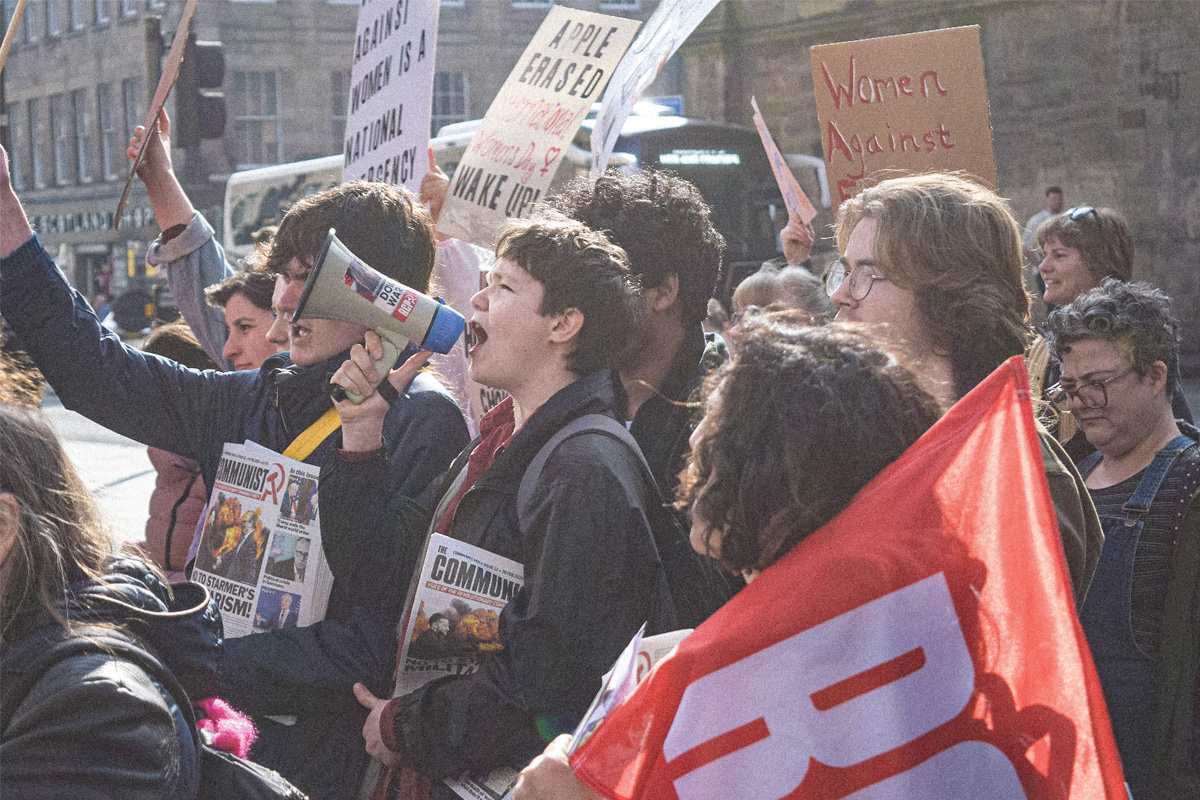Since the start of 2013, Sussex University students have been at the forefront of the British student movement. Whereas the occupations, sit-ins and protests of 2010 and 2011 were a direct response to the trebling of tuition fees to £9,000 per year, the privatisation of on-campus services has been the motivation behind recent events at Sussex. Jo Pickard of the Sussex Marxist Society provides a Marxist perspective on the campaign against privatisation at Sussex.
Since the start of 2013, Sussex University students have been at the forefront of the British student movement. Whereas the occupations, sit-ins and protests of 2010 and 2011 were a direct response to the trebling of tuition fees to £9,000 per year, the privatisation of on-campus services has been the motivation behind recent events at Sussex.
The coverage in the press created a deluge of national and international support. Numerous student unions from across the country voiced their solidarity. Support was even pledged by Caroline Lucas and John McDonnell, Green and Labour MPs respectively, renowned comedians Mark Steel, Frankie Boyle and Josie Long, film director Ken Loach, and even left-wing intellectual Noam Chomsky.
Socialist Appeal strongly supports the campaign against privatisation and outsourcing. The occupation and protests have demonstrated the elan and creativity of students when united around concrete tasks and when using militant methods. The numbers of students participating in meetings and protests has been inspiring and proves that there is widespread opposition to privatisation and cutbacks.
However, the campaign has so far not achieved its goals; the occupation was ended after seven weeks with four students arrested, and the campaign against privatisation still faces many fundemental obstacles. Student militancy and mass activity are by themselves insufficient to overturn the plans of university management, not least because those most affected and with most potential power are the university staff, not the students. As the academic year draws to a close and students disappear from campus, what is next for the campaign at Sussex? What has it achieved and how can the campaign continue?
Origins
During the summer term of 2012, the university management announced their intention to outsource on-campus services. This included the maintenance of university residential housing, cleaning, catering, and security services. This has jeopardised the employment of 235 members of staff on campus, many of whom have been trusted employees of the university for years.
By outsourcing such services, many of these staff members will be made redundant, or see a lowering of their working conditions and wages if they manage to remain employed. Living costs on campus will also be more expensive for students, and any new staff employed by private companies will not be directly accountable to the university but to the private companies. Private, hired security, will no longer be accountable to the university, but will simply be anonymously hired muscle.
These plans to outsource were arranged without any negotiation and without engaging in any legitimate democratic process. Staff and students were not consulted, they were simply told. This failure and blatant lack of consideration for the community of Sussex campus and for democratic procedure has alienated and estranged staff and students from university management. Even those who have up until now regarded themselves as politically ambivalent have expressed a sense of injustice at such unapologetic and shameless disrespect by managerial staff.
Capitalist crisis
However, the plans to outsource campus services do not originate from the ideologically-driven aspirations of Michael Farthing, Vice-Chancellor, and John Duffy, Registrar. While they are doubtless enthusiasts and promoters of business and capital investment, the plans to outsource and encourage privatisation exist within a broader context.
With virtually no announcement, the £29 million Jubilee Building on Sussex Campus, intended for the Politics, Law and Sociology departments, was suddenly awarded to the departments of Business, Management and Economics.
These departments are now able to cater to more students. Coincidentally, many of these departments run courses dominated by international students – historically the “cash cows” of British universities.
Of course, it goes without saying that we stand in solidarity with international students, and are utterly opposed to the sort of draconian, racist measures that were meted out by the government on international students at Metropolitan University in London last September. The fight should be for improved quality and resources in education across the board. But this clear re-orientation towards more profitable university departments, alongside plans to outsource and privatise, demonstrates the priorities for university management and exist within a broader context of an increasingly common alignment with finance capital and private profit.
The issues facing Sussex campus are inherently linked to the same issues as the abolition of the Education Maintenance Allowance (EMA) and the increase in tuition fees. But such drastic and regressive changes are not part of an isolated conspiracy to commodify education in Britain. The recent spending cuts assault by government on disability allowances and housing benefits, and the regressive attacks on the NHS, all derive from the same source – the budget deficit, the Eurozone crisis, and the generalised crisis of capitalism internationally.
What is happening at Sussex University is inherently linked to the broader crisis within capitalism. It is not just Michael Farthing and John Duffy who are braying for “profitability” and “efficiency” – the same buzzwords are being spouted by all the mouthpieces of the capitalist system: David Cameron and George Osborne; German Chancellor Angela Merkel; European Council President Herman Van Rompuy; and across the Atlantic, Barack Obama and Joe Biden.
What is to be done?
At the present time the resistance on Sussex University campus has consisted of weekly protests, attended regularly by more than a hundred people, often swelling to five hundred and up to one thousand.
Frequent anti-privatisation meetings and political discussions are held. Meetings and referendums have been called by the Student Union. The union has tried to negotiate a dialogue with university management. The seven-week occupation of a campus conference centre has taken place, and after its abrupt end attempts were made to re-establish an occupation in an on-campus café, earmarked for privatisation. In these activities, the students were at the forefront. For Marxists this last point is of decisive importance.
Marx consistently emphasised the importance of workers being at the forefront of revolutionary movements. This was not for emotional reasons or down to an infatuation with the working class. It is because of their role in production.
Students simply cannot participate in industrial action in the same decisive way that workers can. If students go on strike, they have no direct impact on production. Their participation in university is individual and competitive; the same collective consciousness cannot develop as it does through participation in social production. Students also tend to leave their respective educational institutions every three or four years. One student may lead tremendously radical campaigns, yet when they leave university, this tradition can more easily be broken and forgotten. For this reason, they cannot possibly build upon experience in the same way that a collective union can. The only guarantee of maintaining a fighting tradition on campus is through a fighting student union and active trade unions, which the students should offer support to and go to for guidance. For these reasons it is vitally important that the staff at Sussex University are central to the dispute regarding outsourcing and privatisation.
Currently, staff have been involved, but in a passive way. Part of this is down to the nature of bullying by management toward ordinary workers that has created an atmosphere of fear and insecurity, intimidating staff not to take a step forward. Students must work with the trade unions on campus in addressing this problem.
Squares of yellow, the motif of the Sussex anti-privatisation campaign, have been displayed on collars and lapels and hung in windows, and a few trade union banners have been unfurled at demonstrations. However, the mood of the staff is not yet one of widespread and generalised anger and resistance – this will come in time.
Statements of support have been issued by the University’s departmental schools of English, International Relations, Sociology, Media, Film and Music, and the centres for Gender Studies and Cultural Studies, with teaching staff signing their names alongside the statements. This shows the mood of discontent which exists on campus; but this must be fostered and developed – trade unions should be balloted for industrial action, and put in a constant dialogue with the active layer of students on campus and within the students union. There must be cohesion and communication between staff and students at all times.
The challenges of student tactics
Staff have expressed support and made appearances at demonstrations, but they do not yet attend the meetings of the Sussex students. This can be attributed to a number of features, all of which serve to alienate workers as well as a wider layer of ordinary students.
The enthusiasm and radicalism of youth often manifests in chaotic methods. This was a feature of the student demonstrations in 2010 and 2011, and has also featured at Sussex. The demonstration on March 25th, in which universities across the nation were represented by student activists participating and attending at Sussex, degenerated after calls to “fuck shit up” by speakers at the initial rally.
What ensued was the smashing of glass doors in Sussex House (home of the management staff at Sussex University), graffiti reading “occupy” scrawled inside the building, the surrounding and kettling of a police officer, and the burning of bank documents from a local Barclay’s bank branch on campus. A number of arrests were made.
These methods are completely counter-productive. The very staff that should be central to the campaign to defend jobs on campus were among the very same staff forced to clean up the mess. As a result, there was a substantial loss of student support, and statements by activists from “Sussex Against Privatisation” have not yet attempted to address or change this behaviour; in fact, they have actively encouraged it.
Anti-privatisation statements scrawled onto the walls of the Law, Politics and Sociology building during February and March have been met with written notifications from staff vocalising support, but simultaneously criticising the use of graffiti. It is the staff who are forced to clean the graffiti off the walls.
The abrupt decision to occupy a café on campus on April 16th led the occupation to issue a formal statement apologising to workers of the café for intimidation. These statements should not have to be made in the first place. Individual, undisciplined tactics and petty expressions of frustration are incredibly destructive to political campaigns. As a result of this, downtrodden workers and disappointed staff members will not miraculously be whipped into a frenzy of support; they will only shy away from the students. The students must therefore conduct themselves in a manner which orientates towards the working class.
Redirecting the anti-privatisation campaign into vengeful attacks on the corporations intending to purchase the privatised services on campus is similarly futile. A recent “Sedexorcism”, targeted at Sedexo – one of the hopeful bidders of the plans to outsource campus services – saw Sussex students dressed up as priests and dressed down in topless protest, descend on Sedexo company headquarters. This is simply bizarre and futile and alienates ordinary people. The aim of such protests is completely misdirected. Should Sedexo be dissuaded from investing at Sussex University, another bidder will inevitably replace them.
The fire of the student movement – with the organisational and campaigning capacity of the student union – should be firmly turned on university management – not individual companies – who can only be challenged by the labour movement on campus, and in Brighton. However, as has been previously mentioned, this is not the consequence of the ideological whims of the Vice-Chancellor, however real they may be.
The limitations of such tactics described above also emphasises the need for any campaign against privatisation, cuts, or fees to be taken up by the student union, which has the capacity to organise and lead a mass campaign involving thousands of students in a genuinely democratic way. Results of a recent referendum (18th April) conducted by the Sussex Student Union revealed 70% support for the student union’s opposition to on-campus privatisation plans; if such a mood exists, then the student union should be utilising this to encourage staff and workers on campus to campaign alongside students. A fighting student union, with the ability to rally and reach out to the mass of students, should be used to approach the trade unions, build links with the local labour movement, and co-ordinate mass actions. In this respect, actions and tactics must be chosen not simply for their militancy, but for their ability to reach out to an ever broader layer of students and workers.
The reason why such disruptive methods have come to the forefront of the campaign lies in the leadership of the student movement, not only locally, but in particular nationally. For years students and higher education have been under serious attack, and yet in the NUS leadership we find nothing but a void. There is no leadership at all, and attempts are made to limit democratic accountability.
Because they don’t offer a lead with fighting socialist policies, the NUS and student union “leadership” leave the student movement atomised and leaderless. What do we mean by fighting socialist policies? The official leadership of the student movement must pledge to fight against all fees and for free education, to be funded by nationalisation of the banking system and the major corporations; to fight for decent and affordable student housing; to oppose all cuts and forms of privatisation. The NUS and local student unions should actively support occupations and lead such campaigns. With all their resources and legitimacy, occupations and demonstrations would be much bigger and more powerful. At Sussex (and in other places) they should establish formal links to the local trade unions and organise a referendum for a mass student strike and blockade of the university against privatisation, rallying as much active trade union support as possible. Huge occupations, demonstrations, strikes and blockades sanctioned and led by the trade unions and student unions would have the power to stop university management in its tracks.
These are the policies we must fight for in the student movement. It is because of the lack of such a leadership in the student unions that disruptive, impatient and even blind methods as described above tend to be used. Unfortunately, the use of these alienating methods is likely to mean that the campaign in Sussex will not lead to a transformation of the student union along these lines. And we must be clear that any occupation, however bold, that fails to take steps towards a socialist programme in the student unions, will end in failure.
The real cause is the crisis of the capitalist system, which cannot afford the reforms of the past, including decent Higher Education. Therefore it is all the more urgent that the student movement begins to assist, in a humble manner, the workers movement – starting at the university and from there taking it into town. The student union must be transformed into a fighting, campaigning organisation that turns outwards and links with the organisations of the labour movement. This is the only way to really fight privatisation.
Likewise, the conduct of “consensus” voting at student meetings, which is completely undemocratic and does not allow for the expression of differences, along with the bizarre waving of arms in the air in ten different ways during a discussion, is a book sealed with seven seals to ordinary students and staff. It does not encourage participation – it is confusing and alienating. Movements and campaigns which seek widespread support should be constantly mindful of such behaviour and the extent to which it invites participation and inclusion. Again, this emphasises the need for the student union to take the lead in organising mass campaigns that can involve the mass of students.
Fight back
In order to really mount a defence of the services available to students at Sussex University, which goes hand in hand with the defence of the jobs of all staff members, the workers themselves must become active participants in the campaign against outsourcing on Sussex campus.
This means not waiting for staff to turn up to student meetings, although they should of course be actively encouraged. More importantly, the student movement must understand the necessarily auxiliary role it has to play in service to the real force that can change things: the trade union and labour movement.
Student activists and the students’ union must approach the campus workers, starting with the shop stewards, in a humble manner and ask how they can help the staff. First and foremost students must listen to the workers, and be prepared to patiently work with them to build the fight back. In order to encourage this, the student leadership must renounce the petty and destructive methods of the past, and fully orientate themselves towards the workers and the wider student body.
Quite clearly, the anger, determination and willingness to make sacrifices are abundantly present amongst the students. What is required is to effectively channel this through the student (and trade) unions with a militant strategy. A student and worker strike, if effectively campaigned for by the unions, would get the enthusiastic backing of the majority of students and staff. If carried out, it would have the power to stop university management and transform the student and trade unions in Sussex. And it would send a shockwave through the national student movement and society in general. Militancy pays.






